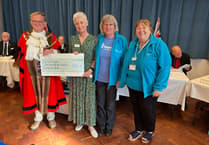A MORETONHAMPSTEAD historian has set out to right the damage done by William Shakespeare to the reputation of a man who may have been one of England?s greatest kings. Ian Mortimer had already written two acclaimed and lively biographies of intriguing figures from the medieval period ? Edward III and, appropriately, Sir Roger Mortimer, when he decided to turn his attention to Henry IV ? the fourteenth-century king who infamously usurped the English throne from Richard II. Henry emerges from Mortimer?s biography as a fascinating figure ? as the only English king to set foot within the walls of Jerusalem; as a man described by his contemporaries as a ?sparkling musician? who played the recorder and wrote choral music; as the greatest tournament knight the English royal family has ever produced; and as the only king known to have designed his own cannon. He did not, however, prove to be an easy subject for the Dartmoor-based biographer. ?Only slowly did it dawn on me what I had let myself in for,? Ian said. ?We hardly knew anything about Henry IV. ?He is the least biographied post-Conquest crowned king. Even his date of birth remained unknown, as did that of his eldest son. I decided that would be my first challenge: to ascertain when Henry and his sons were born.? Ian?s other challenge was to cut through literally centuries worth of propaganda. ?When people think of Henry they think of him as one thing only: England?s usurper king,? he said. ?Dozens of writers have taken the traditional view of Henry and painted him as the dastard who usurped the throne from dear old Richard. ?That Richard was one of the most unstable , self-obsessed tyrants who ever sat on the english throne ? who murdered one of his uncles, attempted to murder another and may even have tried to kill Henry ? was neither here nor there.? One of the principal culprits for popularising the traditional, negative view of Henry was William Shakespeare. So why did Shakespeare present Henry so unjustly? Ian said: ?Queen Elizabeth saw Henry as a threat to the divine right of monarchs. ??Know ye not I am Richard?? she is supposed to have declared. Even though 200 years had passed, men still couldn?t even write about what Henry did, so instead Shakespeare wisely paraded Richard II as the victim of a usurper ? and this tag has hung around Henry?s neck ever since.? Ian began his defence of Henry in spring 2005. The number of online bookshops now in business and the ability to take a digital camera into archives to photograph many documents during a short research trip meant that completing the work on Dartmoor was less difficult than he had expected. ?When I researched my first book, The Greatest Traitor, I spent hours in Exeter University library; by the time I started research on Henry IV, the technological revolution had shifted up a gear,? he said. Having said this, technology was not always on his side: a computer glitch meant that Ian lost the whole of his vivid account of Henry?s famous battle of Shrewsbury, and had to write it from scratch again. This disaster, other commitments (Ian is chairman of the Moretonhampstead local history society, and an active friend of Devon Archives), and the sheer amount of research necessary meant that the book took 17 months to write. Despite the amount of research that went into it, though, Ian insists that The Fears of Henry IV is ?not a work of scholarship.? ?It seeks to reintroduce those human elements which historians as educationalists feel obliged to leave out,? he said. So who was the human Henry that Ian has uncovered? There is no escaping the fact that he was a murderer. Ian began by expecting to prove that Richard may have simply starved himself to death. ?It was quite a shock to realise, halfway through the book, that I was dealing with a man who was not just possibly a murderer but definitely was one,? he said. As Ian?s book proves, Henry IV was a colourful figure. And he was a man with connections to this area too. ?Henry and his father travelled several times down through Exeter to Plymouth, and it was near Exeter that he met his second wife in 1403,? Ian said. ?The two of them rushed together like star-struck lovers. He approaching from the East ? she from the West, via Okehampton. The A30 is less romantic these days!?



